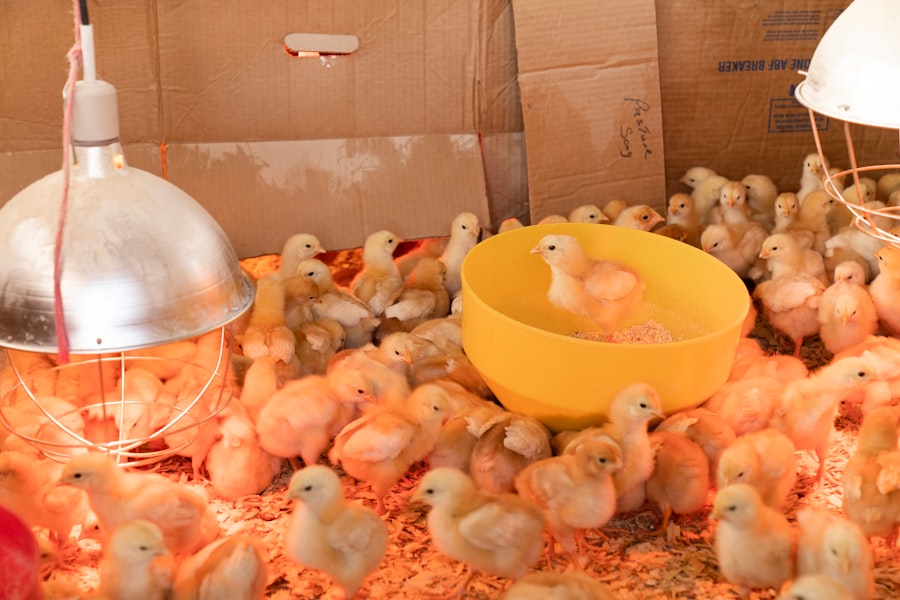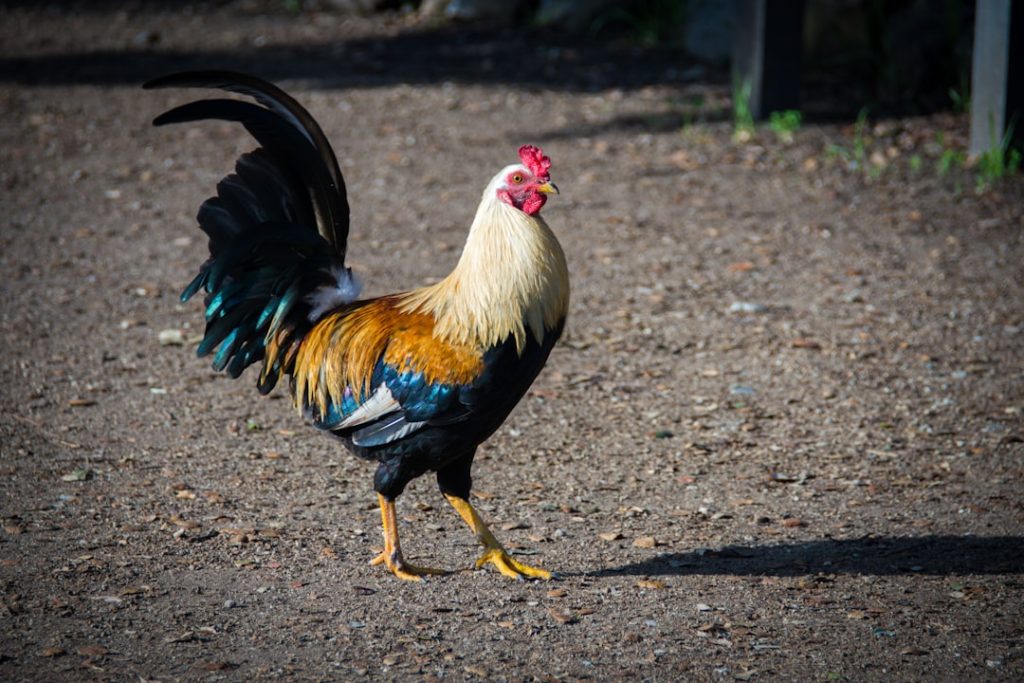Keeping chickens has a long and rich history that dates back thousands of years. Chickens were first domesticated in Southeast Asia around 6000 BC and have since spread to every corner of the globe. Initially, chickens were kept for their meat and eggs, but over time they have also become popular as pets and for their ornamental value.
There are numerous benefits to keeping chickens in your backyard. First and foremost, they provide a sustainable source of fresh eggs. Chickens are also excellent at controlling pests in the garden, as they eat insects, slugs, and snails. Additionally, chickens produce nutrient-rich manure that can be used as fertilizer for your plants. They are relatively low maintenance animals and can be a great educational experience for children.
Key Takeaways
- Keeping chickens can be a fun and rewarding hobby for those with the space and time to care for them.
- Choosing the right breed is important, as different breeds have different temperaments and egg-laying abilities.
- Preparing a chicken coop involves providing adequate space, ventilation, and nesting boxes for the chickens.
- Understanding chicken behavior can help prevent problems such as aggression and egg-eating.
- Feeding and watering chickens requires providing a balanced diet and clean water, and monitoring for signs of illness.
Choosing the Right Breed
When choosing a breed of chicken, there are several factors to consider. First, you need to think about the climate in your area. Some breeds are better suited to cold climates, while others thrive in warmer temperatures. You also need to consider the size of your backyard and the amount of space you have available for your chickens. Some breeds are more docile and can be kept in smaller enclosures, while others require more space to roam.
For beginners, there are several popular breeds that are known for being easy to care for and friendly towards humans. The Rhode Island Red is a popular choice, as it is a hardy breed that is known for its egg-laying abilities. The Plymouth Rock is another good option, as it is a dual-purpose breed that is both good for meat and eggs. The Sussex is also a beginner-friendly breed that comes in a variety of colors.
Preparing the Chicken Coop
The size and location of your chicken coop are important considerations when setting up your backyard flock. The coop should be large enough to comfortably accommodate your chickens and provide them with enough space to move around. It should also be well-ventilated to prevent the buildup of ammonia from chicken droppings.
When it comes to materials, you have several options. Wood is a popular choice for its durability and insulation properties. You will also need wire mesh to keep predators out and provide ventilation. Additionally, you will need nesting boxes for your hens to lay their eggs and perches for them to roost on at night.
Understanding Chicken Behavior
Understanding basic chicken behavior is essential for keeping your flock happy and healthy. Chickens are social animals and thrive in groups, so it is important to have at least three or four chickens to prevent loneliness. They have a natural pecking order, so it is normal for them to establish a hierarchy within the flock.
It is also important to be able to recognize signs of illness or stress in your chickens. Common signs of illness include lethargy, loss of appetite, and abnormal droppings. Chickens can also become stressed if they are overcrowded, not getting enough food or water, or if they are being harassed by predators.
Feeding and Watering Chickens
Chickens require a balanced diet to stay healthy and lay eggs regularly. There are several types of feed available on the market, including pellets, crumbles, and mash. Pellets are a popular choice as they contain all the necessary nutrients in a convenient form. You can also supplement their diet with kitchen scraps, fruits, vegetables, and grains.
Clean water is essential for chickens’ health and well-being. Chickens should have access to fresh water at all times, and their water containers should be cleaned regularly to prevent the buildup of bacteria. It is also important to provide water in a way that prevents contamination from droppings or other debris.
Collecting and Using Eggs

Collecting eggs from your backyard flock is one of the most rewarding aspects of keeping chickens. To collect eggs, simply check the nesting boxes daily and remove any eggs that have been laid. It is important to handle the eggs gently to prevent cracking or damaging the shells.
Fresh eggs are a versatile ingredient that can be used in a variety of recipes. They can be scrambled, fried, boiled, or used in baking. Fresh eggs have a richer flavor and a brighter yolk compared to store-bought eggs. They also have a higher nutritional value, as they are not subjected to the same processing and storage methods.
Keeping Chickens Safe from Predators
Predators can pose a threat to your backyard flock, so it is important to take steps to protect them. Common predators include raccoons, foxes, coyotes, and birds of prey. To protect your chickens, make sure your coop is secure and predator-proof. This includes using sturdy materials, burying wire mesh around the perimeter to prevent digging, and covering the coop with a roof or netting to prevent aerial attacks.
It is also important to secure the coop at night when chickens are most vulnerable. Make sure all doors and windows are securely closed and locked. You can also install motion-activated lights or alarms to deter predators.
Keeping Chickens Healthy
Keeping your chickens healthy is essential for their well-being and productivity. It is important to be able to recognize signs of illness or disease in your flock. Common signs of illness include lethargy, loss of appetite, abnormal droppings, and respiratory symptoms such as coughing or sneezing.
Preventative measures can help keep your chickens healthy. This includes providing a clean and well-ventilated coop, regular deworming, and vaccinations if necessary. It is also important to practice good biosecurity measures, such as quarantining new birds before introducing them to your flock and preventing contact with wild birds.
Cleaning and Maintaining the Chicken Coop
Regular cleaning and maintenance of the chicken coop are essential for keeping your flock healthy. The frequency of cleaning will depend on the size of your flock and the size of your coop. As a general rule, you should clean the coop at least once a week, removing any droppings, replacing bedding, and disinfecting surfaces.
Maintaining a healthy environment in the coop is also important. This includes providing fresh bedding, such as straw or wood shavings, to absorb moisture and control odors. It is also important to regularly check for signs of pests, such as mites or lice, and take appropriate measures to control them.
Fun Activities with Chickens
Keeping chickens can be a fun and rewarding experience, and there are many activities you can do to bond with your flock. Chickens are curious animals and enjoy exploring their surroundings. You can spend time with your chickens by letting them free-range in your backyard or by creating a secure outdoor enclosure for them to roam in.
You can also make DIY toys and treats for your chickens to keep them entertained. For example, you can hang a cabbage or other leafy greens from a string for them to peck at. You can also create a dust bath area using sand or dirt for them to roll around in.
Keeping chickens in your backyard can be a rewarding and fulfilling experience. Not only do they provide a sustainable source of fresh eggs, but they also help control pests in the garden and produce nutrient-rich manure for fertilizing plants. By choosing the right breed, preparing a suitable coop, understanding chicken behavior, providing proper nutrition and care, and taking steps to keep them safe from predators, you can enjoy the benefits of keeping chickens while ensuring their health and well-being. So why not start your own backyard flock today?
If you’re looking for more information on keeping chickens, you might be interested in this article on “The Chicken Coop Country Diner” from Poultry Wizard. It provides a fun and creative way to design a chicken coop that resembles a country diner, adding a unique touch to your backyard. Check out the article here for some inspiration and ideas on how to create a charming and functional coop for your feathered friends.
FAQs
What are the benefits of keeping chickens?
Keeping chickens can provide a source of fresh eggs, fertilizer for gardens, and can be a fun and educational experience for children.
What do chickens need to be healthy?
Chickens need access to clean water, a balanced diet of feed, shelter from the elements, and protection from predators.
What kind of housing do chickens need?
Chickens need a coop that is dry, well-ventilated, and secure from predators. The coop should also have nesting boxes for laying eggs and perches for roosting.
What do chickens eat?
Chickens require a balanced diet of feed that includes protein, carbohydrates, vitamins, and minerals. They also enjoy eating fresh fruits and vegetables as treats.
How often do chickens lay eggs?
Chickens typically lay one egg per day, but this can vary depending on the breed and age of the chicken.
How do you care for baby chicks?
Baby chicks require a warm and dry environment, access to clean water and feed, and protection from predators. They also need to be handled gently and kept in a safe and secure area until they are old enough to join the rest of the flock.
What are some common health issues for chickens?
Common health issues for chickens include respiratory infections, parasites, and egg-laying problems. It is important to monitor your chickens’ health and seek veterinary care if necessary.
What should you do with chicken waste?
Chicken waste can be used as fertilizer for gardens, but it should be composted first to reduce the risk of spreading disease. It is important to properly dispose of chicken waste to prevent contamination of water sources.
Meet Walter, the feathered-friend fanatic of Florida! Nestled in the sunshine state, Walter struts through life with his feathered companions, clucking his way to happiness. With a coop that’s fancier than a five-star hotel, he’s the Don Juan of the chicken world. When he’s not teaching his hens to do the cha-cha, you’ll find him in a heated debate with his prized rooster, Sir Clucks-a-Lot. Walter’s poultry passion is no yolk; he’s the sunny-side-up guy you never knew you needed in your flock of friends!







